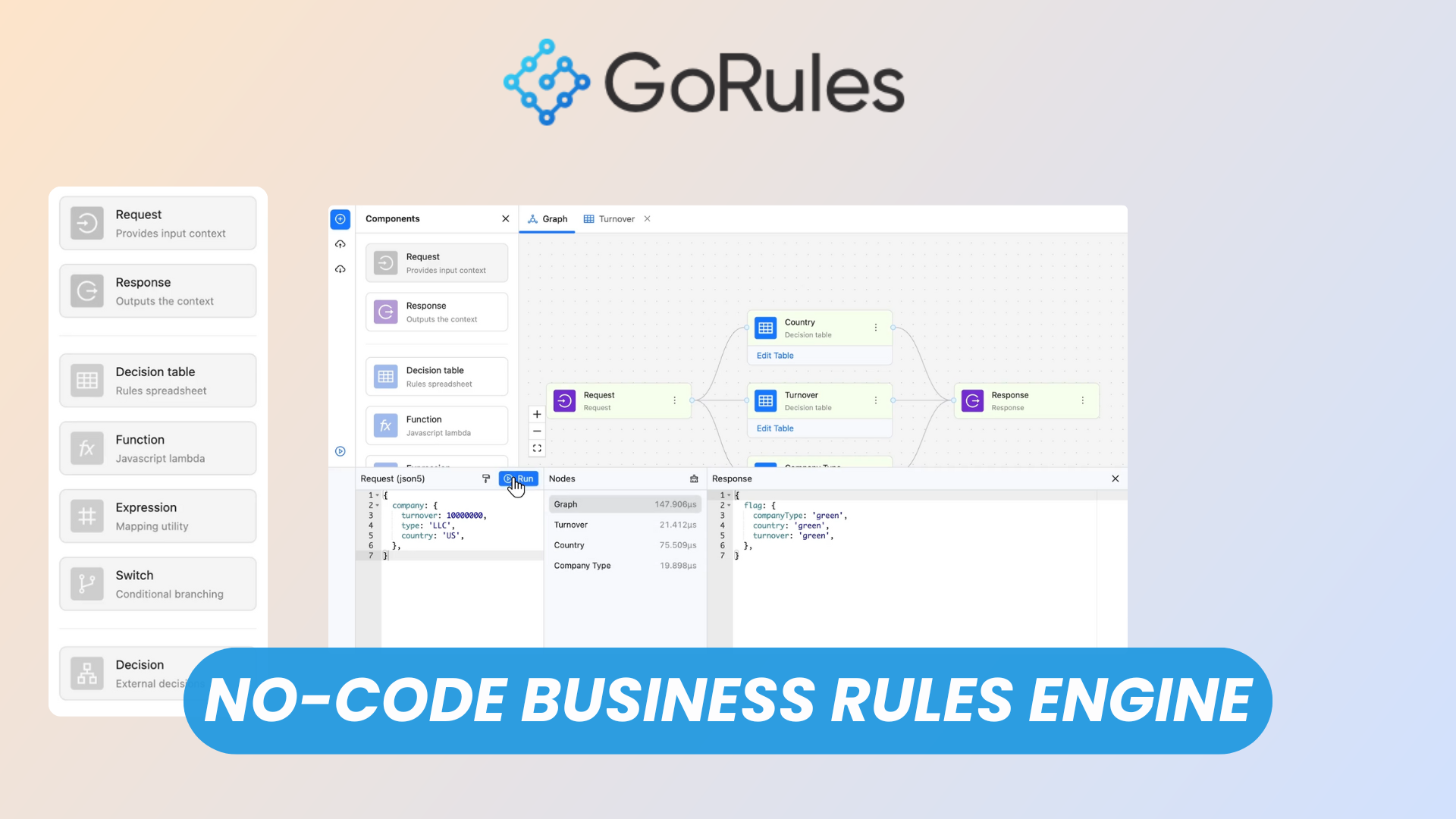GoRules: Free Open Source Business Decisions Visual Editor

In the ever-evolving world of software development, businesses often require complex decision-making processes to be automated and visualized. A business rule engine (BRE) can play a crucial role in streamlining decision logic, allowing for flexibility and rapid adjustments without deep technical knowledge.
GoRules is a free and open-source business decisions visual editor that empowers non-developers and developers alike to define, manage, and automate business rules. In this article, we’ll explore how GoRules integrates no-code features, decision tables, expressions, and functions, as well as its backend flexibility with support for multiple programming languages like Rust, Node.js, Python, and Go.
No-Code Business Rules Visual Editor
GoRules brings a no-code solution to the business rules automation landscape, allowing users to create, visualize, and edit business rules without the need for any coding. This approach is particularly beneficial for business analysts or decision-makers who may not have technical expertise but need to define and modify complex decision criteria. By utilizing a graphical interface, GoRules simplifies the process of laying out decision-making workflows, which can be easily interpreted and adjusted by stakeholders across the organization.
Users can drag and drop elements to define the flow of their business logic, ensuring decisions are made quickly and in a transparent manner. The visual editor eliminates the complexity of traditional rule engines and empowers users to configure rules to suit business needs, reducing the dependency on IT teams for rule changes and improvements.
Decision Table / Expression / Function / Switch
GoRules offers flexibility in the types of business rules it can accommodate. Among the key components are:
- Decision Tables: Decision tables are a structured way to represent complex decision-making logic in a table format, where inputs are matched against conditions, and actions are taken based on those conditions. GoRules allows users to define conditions and actions in an intuitive tabular format, making it easier to visualize how business decisions are made.
- Expressions: In some cases, business logic requires the use of expressions that evaluate conditions or perform calculations. GoRules supports the use of expressions to enhance rule definitions, allowing for dynamic behavior based on the inputs and data available.
- Functions: GoRules enables the use of functions to encapsulate reusable logic. Functions can simplify decision tables by abstracting common patterns into distinct blocks of logic that can be referenced multiple times throughout the system.
- Switch: The switch case mechanism is supported in GoRules, offering an alternative way of structuring decision logic based on multiple conditions. It provides an efficient and scalable way to handle branching logic within rules, further enhancing the clarity of decision-making.
These features help users create sophisticated decision workflows that are easily maintainable, ensuring the business rules can grow and adapt to new requirements over time.
Business Rule Engine (Rust / Node.js / Python / Go)
Under the hood, GoRules integrates with several popular backend technologies, giving it the versatility to handle a wide range of applications.
- Rust: Known for its performance and memory safety, Rust can be a powerful choice for GoRules when speed is critical. Using Rust as the engine backend allows GoRules to execute business decisions at lightning-fast speeds, making it suitable for high-performance systems.
- Node.js: For applications that demand scalability and flexibility, Node.js is an excellent choice. The GoRules engine built on Node.js ensures fast, asynchronous rule evaluations, making it a great fit for real-time applications.
- Python: Python is a well-known language for its simplicity and readability. With GoRules supporting Python, users can leverage Python’s wide range of libraries and ease of use to integrate complex business logic into their applications while maintaining quick development cycles.
- Go: As the name suggests, GoRules is well-suited to work with the Go programming language. Go’s concurrency model and simplicity make it a perfect match for GoRules, ensuring the engine can handle parallel decision-making and large-scale data processing efficiently.
This backend flexibility allows GoRules to cater to a wide array of businesses, from startups to large enterprises, offering a decision engine that fits into the existing tech stack seamlessly.
Conclusion
GoRules is a robust and flexible open-source business rule engine that empowers businesses to automate decision-making processes without requiring deep coding expertise. By offering a no-code visual editor, GoRules democratizes the ability to define, manage, and modify business rules. With its decision table, expression, function, and switch capabilities, users can build sophisticated decision-making workflows that adapt to dynamic business environments.
The integration with backend technologies such as Rust, Node.js, Python, and Go ensures that GoRules can be tailored to various performance and scalability needs. Whether you’re a business analyst looking for an easy-to-use visual tool or a developer seeking a high-performance solution, GoRules provides a comprehensive platform for modern business automation.

